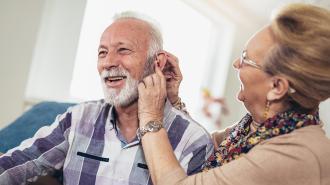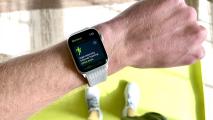The FDA is finally making over-the-counter hearing aids available to Americans, potentially giving millions of people access to better hearing.
“Today’s action by the FDA represents a significant milestone in making hearing aids more cost-effective and accessible,” said Xavier Becerra, the US Secretary of Health and Human Services (HHS).
Why it matters: Hearing loss is incredibly common and has a huge impact on a person’s quality of life, making it harder to work, attend school, and socialize.
It can also be dangerous — people might not hear a car coming while crossing the street, for example. Hearing loss can even lead to mental health issues, such as depression, and has been associated with cognitive decline in seniors, too.
Americans pay more than $5,000 for their hearing aids, and insurance often doesn’t cover them.
The challenge: Hearing aids can be life-changing for a person experiencing hearing loss, but only 20% of the estimated 30 million Americans who could benefit from the devices use them.
Cost is a major reason for this low adoption rate. Between the hearing aids themselves and the expense of seeing an audiologist to have them prescribed and fitted, a person in the US pays on average more than $5,000 for their hearing aids, and insurance often doesn’t cover them.
Stigma is another barrier to adoption — a person might not want to see a doctor about their hearing loss due to its association with being “old” — and for people in rural or lower-income places, simply finding an audiologist nearby can be an insurmountable barrier.
Over-the-counter hearing aids: In 2017, Congress passed a law allowing hearing aids to be sold over the counter, but it’s taken years for the FDA to finish the regulations to put it into effect.
The FDA has now finalized a rule establishing a category of over-the-counter hearing aids for mild to moderate hearing loss.
We could start seeing over-the-counter hearing aids in stores and online as soon as mid-October.
This eliminates the need for millions of people to see a doctor for a prescription and reduces the amount of red tape developers must navigate to get a new hearing aid approved.
The FDA’s rule goes into effect in 60 days, meaning we could start seeing these devices in stores and online as soon as mid-October.
The impact: Frank Lin, a professor at Johns Hopkins who helped draft reports that influenced the new law, said in 2021 that he expects the rule will bring major tech companies into the hearing aid market.
“Right now, five multinational companies control more than 90% of the global marketplace for hearing aids,” Lin said.
“They got the regulations right in the sense that there is a very clear glide path for companies like Apple, Samsung, and Bose to enter the hearing aid market. And that shapes the whole dynamic very quickly around stigma, access, cost — everything.”
“We may literally see new ways hearing aids work, how they look.”
Nicholas Reed
While we don’t know exactly how much cheaper over-the-counter hearing aids might be, the White House estimates the savings could be as much as $2,800 per pair — and that’s assuming the new hearing aids are still basically similar to existing ones.
“This could fundamentally change technology,” audiologist Nicholas Reed told the New York Times. “We don’t know what these companies might come up with. We may literally see new ways hearing aids work, how they look.”
We’d love to hear from you! If you have a comment about this article or if you have a tip for a future Freethink story, please email us at [email protected].





